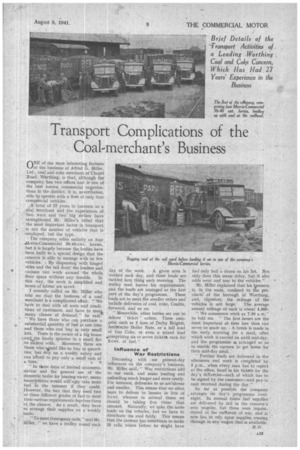Transport Complications of the Coal-merchant's Business
Page 25

If you've noticed an error in this article please click here to report it so we can fix it.
— Brief Details of the -Transport Activities of a Leading Worthing Coal and Coke Concern, Which Has Had 27 rears' Experience in the
Business
d'INE of the most interesting features 1,-/of the business. of Alfred G. Miller, Ltd., coal and coke merchant of Chapel Road, Worthing,. is that, although the company. has two offices and is one of the hest known commercial organizations in the district, it is, nevertheless, able to operate with a fleet of only four commercial vehicles.
A total of 27 years in business as a coal merchant and the experience's of .
two wars and 'two big strikes have strengthened Mr. Miller's belief that the most important factor in transport is not the number of vehicles that is employed, but the type.
The company relies entirely on four Morris-Commercial 90-40-cwt. lorries, hut it is largely because the, bodies have been built to a special design that the concern is able to manage with So few vehicles. • By dispensing with hinged sides and the tail door; the loaders and • carman can work around the whole floor space without any trouble, In this way, the work is simplified and hours of labour are saved.
I recently called on Mr. Miller who told me that the business of a coal merchant is a complicated affair. " We hate to deal with all sorts and conditions of customers, and have to mech • many classes of demand," he said.
• " We have those Who can purchase a substantial quantity of fuel at one time and those who can buy in only small lots. There is the owner of a big house ,-.ancLthe lonely spinster in a small fiat to reckon with. Moreover, there are ' those who \would like to buy in quanti ties, but rely on a weekly salary and can afford to pay only 4 small sum at a time. l• " In these days of limited accommo-dation and the general use, of the domestic boiler for heating water, many householders would will'ngly take more fuel in the summer if they could. .However, the fact that they need two or three different grades of fuel to meet their various requirements deprives them of. the chance. As a result, they have to arrange their supplies on a weekly basis.
"To meet thesetnany calls," said Mr. " we have a trolley round each day of the week. A given -area is
worked each day, and these loads are tackled first thing each morning. The trolley man knows his requirements, and the loads are arranged as the first part of the day's programme. These loads are to meet the smaller orders and include deliveries of coal, coke, Coalite, firewood, and so :on.
. "Meanwhile, other lorries set out to deliver ' ticket '. orders. These comprise such as 2 tons of Derby Brights, Anthracite Boiler Nuts, or a full load of Gas Coke, or even a mixed load ‘comprising six or seven tickets, each for' 5-cwt. of ftiel."
Influence of War Restrictions Discussing with me present-day influences on the company's business, Mr. Miller said, " War restrictions add to our work, and make loading and
• unloading much longer and more costly. For instance, deliveries to us areslower and smaller. This means that we often have to deliver to houses in lots of 2-cwt. whereas in normal times we should be taking five times that amount. Naturally, we take the same loads on the vehicles, but we have to distribute the coal fairly. This means that the carman has sometimes to make 20 calls where before he Might have had only half a dozen on his fist. Not only does this mean delay, but-it also adds wear and tear to the vehicles."
Mr. Miller explained that his kusiness is, in the main, confined to the precincts' _of the borough 'of Worthing, and, therefore, the mileage of the vehicles is not large. The average annual mileage of each is about 4,500.
" We commence work at 7.30 am," he told me. " The first hours are the Most important a'S time lost then can never be made up. • A break is made in the early morning for a meal, after which work is carried on until mid-day, and the programme la arranged so as to enable the carmen to get home for their mid-day meal. " Further loads are delivered in the afternoon and work is completed by 5 p.m., when etrery man has to report at the office, band in his tickets for the day's deliveries—each of which has to be ,signed by the customer—and pay-in cash received during the day."
So far as possible the company arranges its day's programme overnight. In normal times ftel supplies are delivered by rail in the concern's own wagons, but these were requisitioned at the outbreak of war, and it now has to rely upon supplies coining through in any wagon that.is
.NW.




















































